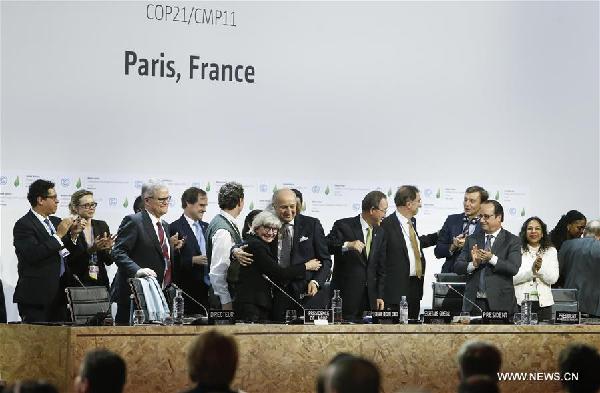China's climate action good for middle class
Updated: 2016-01-12 07:50
By CAROLINE ANSTEY/PAUL DONOVAN(China Daily)
|
|||||||||
 |
|
The final conference at the COP21, in Le Bourget, Paris, Dec 12, 2015. [Photo/Xinhua] |
The year 2015 was the warmest on record globally. In Asia, we saw the strongest El Nino ever recorded, which was linked to drought in Southeast Asia, wildfires in Indonesia and an unusually active cyclone season in the Pacific. We also saw the first ever "red alert" for smog in Beijing, driven in part by the burning of fossil fuels, which contribute to climate change.
But we also saw real progress in tackling climate change with the historic agreement in Paris by 196 countries, including China, to try to limit the rise in global temperature to less than 2 degrees C. While talking about the impacts of climate change, however, we often overlook the world's middle-class population, which has swelled to 1 billion and is concentrated in rapidly growing, densely populated cities, mostly located in coastal areas of emerging markets where manufacturing and trade have flourished.
The Paris agreement comes at a critical time for them: UBS's analysis of data for more than 200 cities around the world found that the middle class is highly exposed to weather hazards and underinsured. Our report, "Climate Change: A Risk to the Global Middle Classes", concludes Asia, China in particular, is high on the risk indicators given the rapid urbanization and economic progress of the region.
These risks take several forms. High temperatures harm productivity in both agricultural and non-agricultural industries. When annual average temperatures reach between 20 C and 30 C, labour supply, productivity and crop yields all decline abruptly.
Also, a city can be a dangerous place during heat waves. Large expanses of asphalt and limited green space contribute to a localized increase in temperature of up to 3 C during the day and by as much as 12 C in the evening. This exponentially increases the risk of heat-related mortality-more than 50,000 Russians died in the heat wave of 2010. Air-conditioning helps, but ultimately creates a vicious cycle: increased energy demand leads to increased air pollution from fossil fuels and higher carbon dioxide emissions that drive up temperatures further.
Related Stories
Paris climate deal gives Chinese modernization new impetus 2016-01-08 18:14
Climate Change and Green Growth: A Perspective of the Division of Labor 2016-01-04 15:12
Climate change is good news for English wine 2015-12-27 11:47
Cooperation essential on climate: panel 2015-12-22 11:19
Today's Top News
Inspectors to cover all of military
Britons embrace 'Super Thursday' elections
Campaign spreads Chinese cooking in the UK
Trump to aim all guns at Hillary Clinton
Labour set to take London after bitter campaign
Labour candidate favourite for London mayor
Fossil footprints bring dinosaurs to life
Buffett optimistic on China's economic transition
Hot Topics
Lunar probe , China growth forecasts, Emission rules get tougher, China seen through 'colored lens', International board,
Editor's Picks

|

|

|

|

|

|







